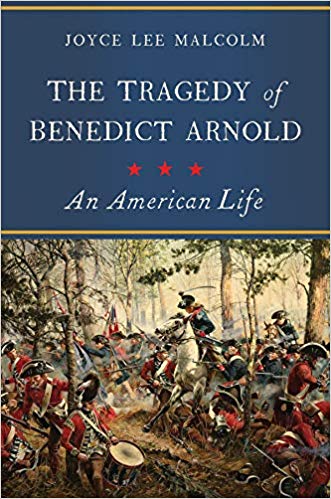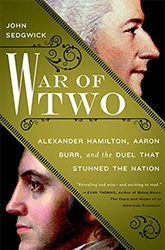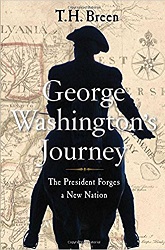History Prize Winners
2019

The Tragedy of Benedict Arnold: An American Life by Joyce Lee Malcolm;
Joyce Lee Malcolm, Patrick Henry Professor of Constitutional Law and the Second Amendment at Antonin Scalia Law School, is an historian and constitutional scholar active in the area of constitutional history, focusing on the development of individual rights in Great Britain and America. Her book, The Tragedy of Benedict Arnold: An American Life, is a vivid and timely re-examination of one of young America’s most complicated figures: the war hero turned infamous traitor, Benedict Arnold. Proud and talented, history now remembers this conflicted man solely through the lens of his last desperate act of treason. Yet the fall of Benedict Arnold remains one of the Revolutionary period’s great puzzles. Why did a brilliant military commander, who repeatedly risked his life fighting the British, who was grievously injured in the line of duty, and fell into debt personally funding his own troops, ultimately became a traitor to the patriot cause?.
2018

War of Two: Alexander Hamilton, Aaron Burr, and the Duel that Stunned the Nation by John Sedgwick;
John Sedgwick is a journalist, memoirist, novelist, biographer and historian who has written, or co-written, thirteen books. In War of Two, he explores the long-standing conflict between Founding Father Alexander Hamilton and Vice President Aaron Burr. Matching each other’s ambition and skill as lawyers in New York, they later battled for power along political fault lines that would decide—and define—the future of the United States. A series of letters between Burr and Hamilton suggests the duel was fought over an unflattering comment made at a dinner party. But another letter, written by Hamilton the night before the event, provides critical insight into his true motivation. It was addressed to former Speaker of the House Theodore Sedgwick, a trusted friend of both men, and the author’s own ancestor.
2017

George Washington’s Journey by Professor T.H. Breen of North Western University and the University of Vermont;
Timothy H. Breen is currently the William Smith Mason Professor of American History Emeritus at Northwestern University and a James Marsh Professor at Large at the University of Vermont. He is the founding director of the Kaplan Humanities Center and the Nicholas D. Chabraja Center for Historical Studies at Northwestern. Breen is a specialist on the American Revolution. He studies the history of early America with a special interest in political thought, material culture, and cultural anthropology. Breen has published multiple books and over 60 articles. In 2015 he released his latest book, George Washington’s Journey.
2016

Independence Lost by Professor Kathleen DuVal of University of North Carolina at Chapel Hill;
Over the last decade, award-winning historian Kathleen DuVal has revitalized the study of early America’s marginalized voices. Now, in Independence Lost, she recounts an untold story as rich and significant as that of the Founding Fathers: the history of the Revolutionary Era as experienced by slaves, American Indians, women, and British loyalists living on Florida’s Gulf Coast.
2015

The Royalist Revolution by Dr. Eric Nelson of Harvard University;
Eric Nelson is the Robert M. Beren Professor of Government at Harvard University. His research focuses on the history of political thought in early-modern Europe and America, and on the implications of that history for debates in contemporary political theory. Particular interests include the history of republican political theory, the relationship between the history of political thought and the history of scholarship, theories of property, and the phenomenon of secularization. Nelson is the author of The Royalist Revolution: Monarchy and the American Founding (Harvard/Belknap, 2014),
2014

The Men Who Lost America Professor Andrew Jackson O’Shaughnessy of the University of Virginia;
Andrew Jackson O’Shaughnessy is the Saunders Director of the Robert H. Smith International Center for Jefferson Studies at Monticello, and Professor of History at the University of Virginia. He is the author of An Empire Divided: The American Revolution and the British Caribbean (Philadelphia: University of Pennsylania Press, 2000) and The Men Who Lost America: British Leadership, the American Revolution, and the Fate of the Empire(New Haven:Yale University Press, 2013)
2013

American Emperor: Aaron Burr’s Challenge to Jefferson’s America by David O. Stewart, attorney and author;
David O. Stewart turned to writing after more than a quarter century of law practice in Washington, D.C. as a trial and appellate lawyer. The book explores Burr’s astounding Western expedition of 1805-07 and his treason trial before Chief Justice John Marshall.
2012

Adams vs. Jefferson: The Tumultuous Election of 1800 by Professor Emeritus John E. Ferling, professor of history at the University of West Georgia.
John E. Ferling is a leading historian in the American Revolution, he has appeared in television documentaries on PBS, the History Channel, C-SPAN Book TV, and the Learning Channel
2011

Separated by Their Sex by Professor Mary Beth Norton, is the Mary Donlon Alger Professor of American History at the Department of History at Cornell University.
In Separated by Their Sex, Mary Beth Norton offers a bold genealogy that shows how gender came to determine the right of access to the Anglo-American public sphere by the middle of the eighteenth century. Earlier, high-status men and women alike had been recognized as appropriate political actors, as exemplified during and after Bacon’s Rebellion by the actions of—and reactions to—Lady Frances Berkeley, wife of Virginia’s governor. By contrast, when the first ordinary English women to claim a political voice directed group petitions to Parliament during the Civil War of the 1640s, men relentlessly criticized and parodied their efforts. Even so, as late as 1690 Anglo-American women’s political interests and opinions were publicly acknowledged.